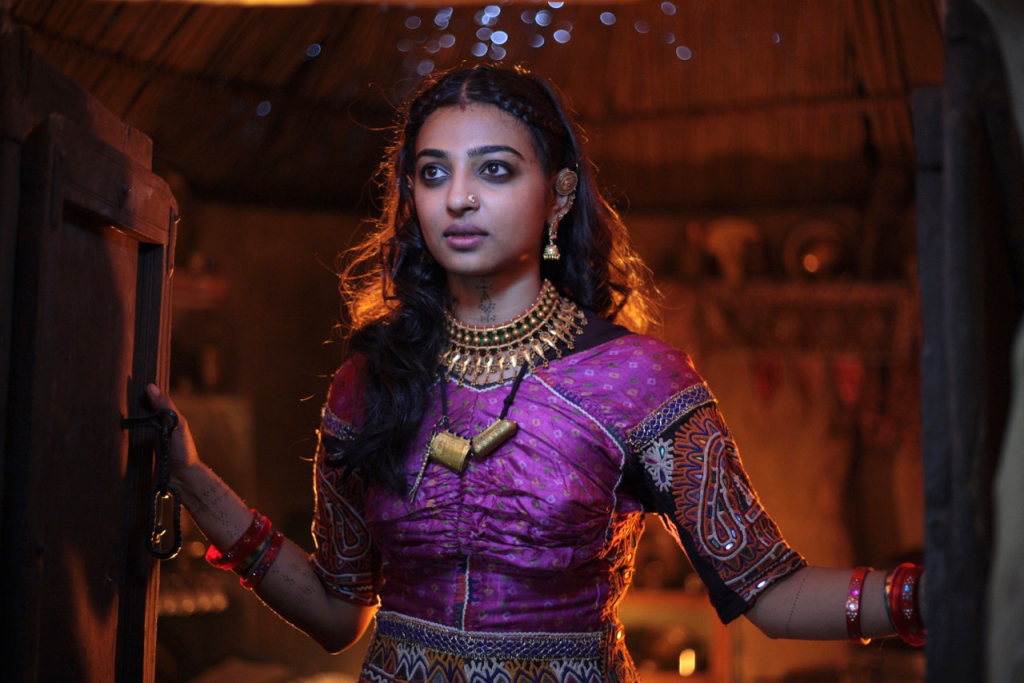![]() In a remote desert northwestern village in contemporary India, patriarchal rule is alive and well. Women’s lives are devoted to serving the men’s needs, and education is discouraged if not forbidden. (“Women who read make bad wives.”) It’s also where a woman’s sexuality can be her greatest asset and a curse, either way condemning her to a life of subservience. Director Lena Yadav has turned first-hand knowledge into an intriguing script that, combined with Russell Carpenter’s (Titanic) rich and varied cinematography, gives voice to women who have little or no say over their own lives.
In a remote desert northwestern village in contemporary India, patriarchal rule is alive and well. Women’s lives are devoted to serving the men’s needs, and education is discouraged if not forbidden. (“Women who read make bad wives.”) It’s also where a woman’s sexuality can be her greatest asset and a curse, either way condemning her to a life of subservience. Director Lena Yadav has turned first-hand knowledge into an intriguing script that, combined with Russell Carpenter’s (Titanic) rich and varied cinematography, gives voice to women who have little or no say over their own lives.
Rani, in her 30s and widowed for 15 years, is in search of a suitable bride for her only son, 17-year-old Gulab (Riddhi Sen). She finds one in 15-year-old Janaki (Lehar Khan), whose lush and sexually desirable head of hair lead Rani to mortgage her hut to secure the price of the dowry. But when Janaki arrives for the ceremony shorn of her beautiful locks, Gulab wants nothing to do with his new bride. He continues to spend his mother’s money drinking and whoring with his single friends, leaving Rani to struggle alone to pay for her self-perceived failure.
Rani’s outwardly exuberant best friend, Lajjo (Radhika Apte), is married to an abusive alcoholic. He excuses the beatings by blaming her for not having children. Lajjo accepts this as her due and seeks solace in Rani’s company after each beating. Another of Rani’s friends is the dancer/prostitute Bijli. She stars in a travelling burlesque show that moves from village to village to provide entertainment for the men. She takes advantage of her top billing by picking and choosing when and to whom she provides favors, failing to heed the warnings that she could soon be replaced by a younger, more willing talent.
While Rani and Lajjo privately rail against their lot in life, they are generally resigned to their fate. Bijli, on the other hand, uses her charms to lead a comparatively privileged life and to believe that she can control her own destiny. When the three women are together, their discussions serve as a humor filled release of pent-up rage and an opportunity for revelatory insight. In such a moment, Bijli informs the incredulous Lajjo that her failure to get pregnant could be her husband’s fault, and she unknowingly opens a Pandora’s box that will affect all three women’s futures.
Tannishtha Chatterjee gives a sly, multilayered portrayal of Rani’s stubborn adherence to tradition, despite her keen awareness of its injustice. Surveen Chawla, as Bijli, is deliciously seductive and totally believable in her naiveté that she can continue to live outside the rules.
A vibrant palette of festival colors and skillful lighting enhance the visual impact, setting up a contrast to the stark desert backdrop. Sensually rich, sexually charged scenes offset (and sometimes lead to) the violence and degradation. Through their clever use of contrasts, director and cinematographer weave a fairy tale element into the harsh reality in which these women live.
This is fast-paced popular entertainment that all women will relate to in one way or another. For those who convince their male companions to see it with them, be prepared for some telling conversation afterward.
Written, Produced, and Directed by Leena Yadav
Released by Wolfe Video
Hindi with English subtitles
India/USA. 116 min. Not rated
With Tannishtha Chatterjee, Radhika Apte, Surveen Chawla, Lehar Khan, Riddhi Sen, and Mahesh Balraj

















Leave A Comment